Benedict Cumberbatch on challenge of playing a bullying misogynist
- Published
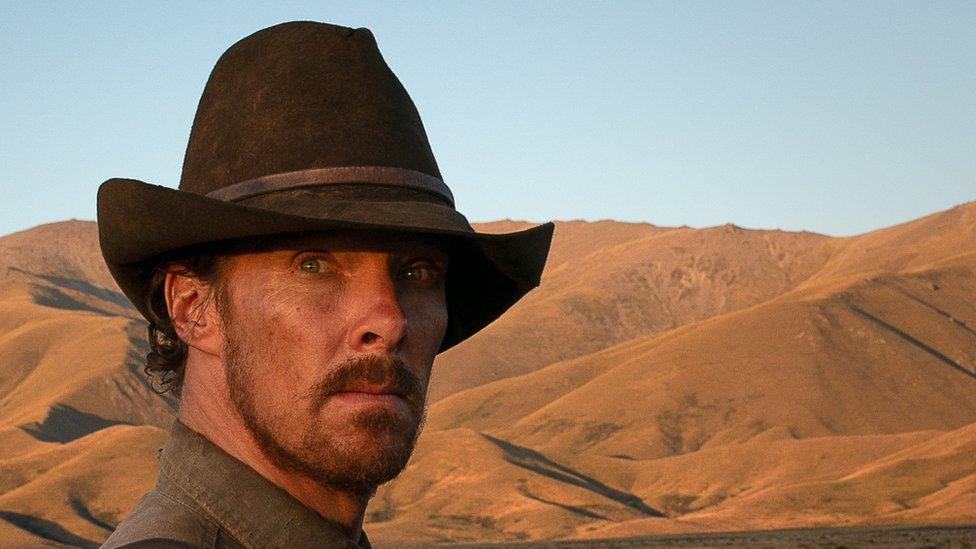
Benedict Cumberbatch plays US rancher Phil, described by director Jane Campion as a bully and a misogynist
Benedict Cumberbatch says that starring as a brilliant but cruel rancher in Jane Campion's Oscar-tipped film The Power of the Dog helped him re-examine his habit of "people-pleasing".
Campion encouraged him to adopt some of the personality traits of his character, Phil Burbank, for the duration of the film shoot.
"I'm quite apologetic and a people pleaser," he tells BBC News.
"Whereas with Phil, I had to stand my ground, and just say no, and be happy to do that.
"Jane really helped facilitate that, right at the beginning she introduced me to the crew, saying, 'this is Phil, you'll meet Benedict at the end of the shoot, he's really nice. This is Phil.' It gave me full permission to do that, without feeling self-conscious. Because it's a way to go, it's far away from me, it's quite a transition."
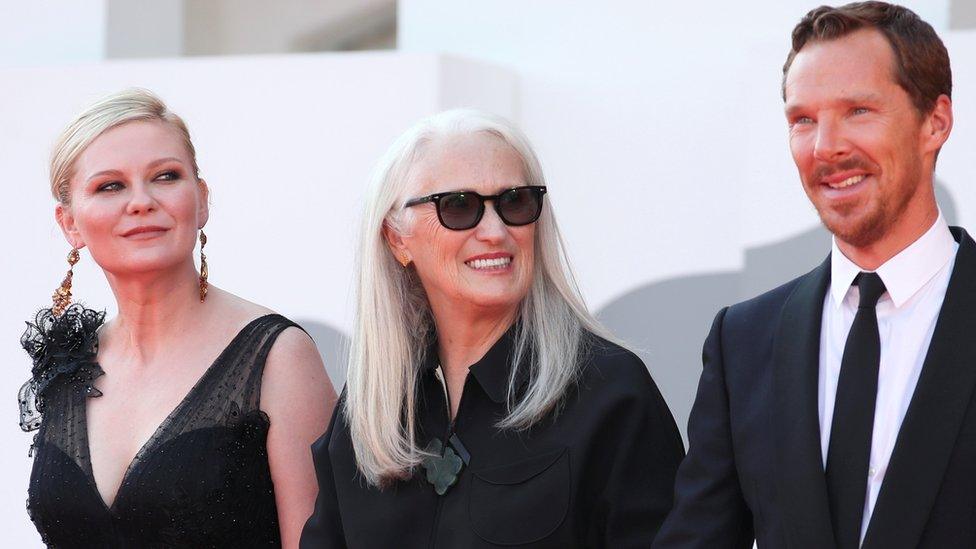
Dunst, Campion and Cumberbatch were at the film's September screening at Venice Film Festival
Asked if the experience had helped him to stand his ground when he wasn't in character, he replies, "I think so, yeah. I think a little bit. Hopefully in a nice way, but just also realise - it's alright, you can't please everyone, just be true to yourself."
The Power of the Dog is an adaptation of a 1967 Thomas Savage novel. Set in Montana in 1925, it's the story of a wealthy rancher, George, who brings home a wife, Rose (played by Kirsten Dunst) and her son Peter.
George's brother Phil sets out to destroy Rose with his threatening and bullying behaviour, driven by his own struggle to accept his authentic self.
New Zealand-born director Jane Campion, who won a best screenplay Oscar for her 1993 film The Piano, describes Phil Burbank a one of the "great characters of American fiction" - but explains why she asked Benedict Cumberbatch to adopt some of his characteristics on set.
"To find Phil and to keep Phil is a challenge for any actor, and short of having an actual Phil, who would be terrifying to work with, it's probably impossible," she says. "It was a matter of just finding a supportive mechanism, so he could stay with the character.
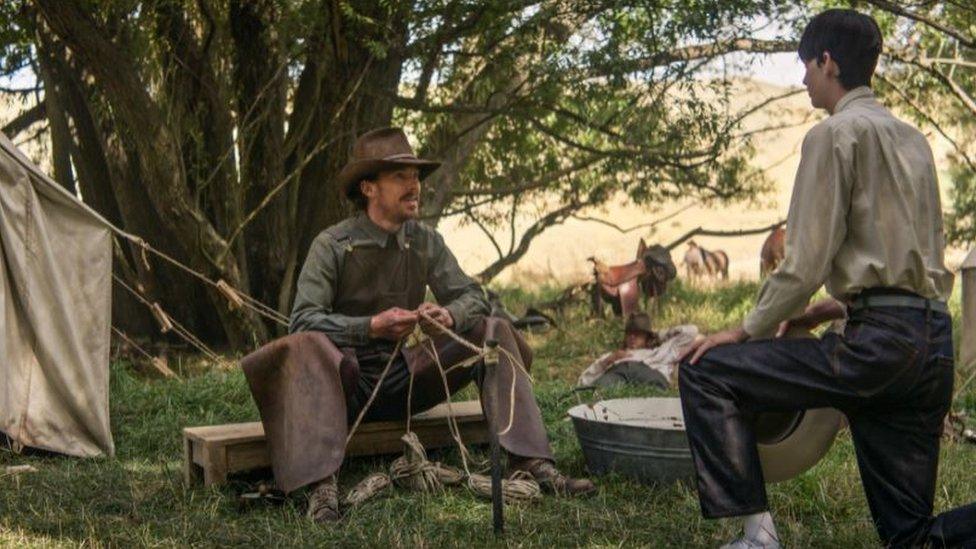
Phil and Peter have a complex relationship in the film
"Benedict is a real gentleman and he's all 'excuse me,'' sorry', 'please' - and all that language is completely wrong for Phil. So right at the beginning of rehearsals, I said, 'here are some challenges for you. I don't want you to say yes to anything, but to say no first to everything and never say please or thank you or sorry.'
"I think he was both fazed and excited by it. We're so trained to be accommodating and that's really tiring as well, and I think he enjoyed playing with that. There were a lot of people excited to be working on a Benedict Cumberbatch film and wanting to have a chat with him, and that's exhausting for an actor.
"Some of the crew were saying 'that's a pity, I was looking forward to having a chat or a talk with him' but that's not what we were doing here."
Campion, who has directed work including The Piano, Top of the Lake and In the Cut with mainly female protagonists, adds that she didn't give Kirsten Dunst the same instructions with the character of Rose.
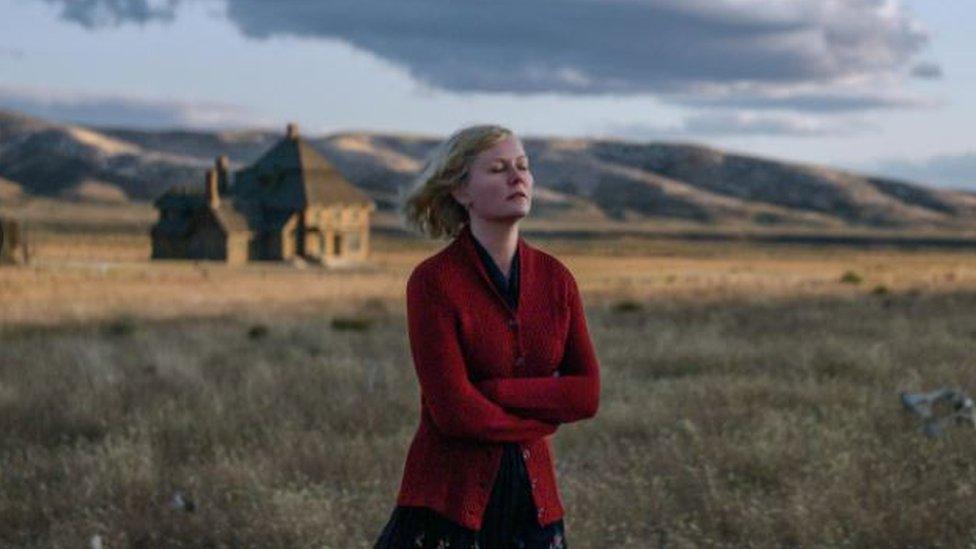
Kirsten Dunst plays Rose, whose vulnerability is threatened by Cumberbatch's character Phil
"I didn't as much actually, as she had a fairly good handle on Rose," she says. "It's quite painful to play a character like Rose as it's a crushed experience from the inside and it's an experience many of us women had growing up before we find our voice or a way to assert our space. I think it took her back into some spaces that were really uncomfortable."
Dunst herself says that "I would have played Phil" in order to work with Campion but that she kept distance from Cumberbatch on set during filming in New Zealand as part of finding "my own demon of Phil."
"Benedict and I didn't talk during the filming either. I mean if we went out to dinner on the weekend with our kids, and hung out, obviously we talked to each other, but on set, we kept our distance. It's part of the dynamic, and also Benedict's really nice, and sweet, and his natural way of being is to be kind and say hello."
Cumberbatch describes the display of so-called "toxic masculinity" and bullying from Phil in the movie as "brutal. It really is. Its effect on Rose is devastating. He's terrified. It's a full defensive attack, the thing we do as a species. The frontal cortex is not engaging, he doesn't see her as anything other than a threat, and also her son Peter".
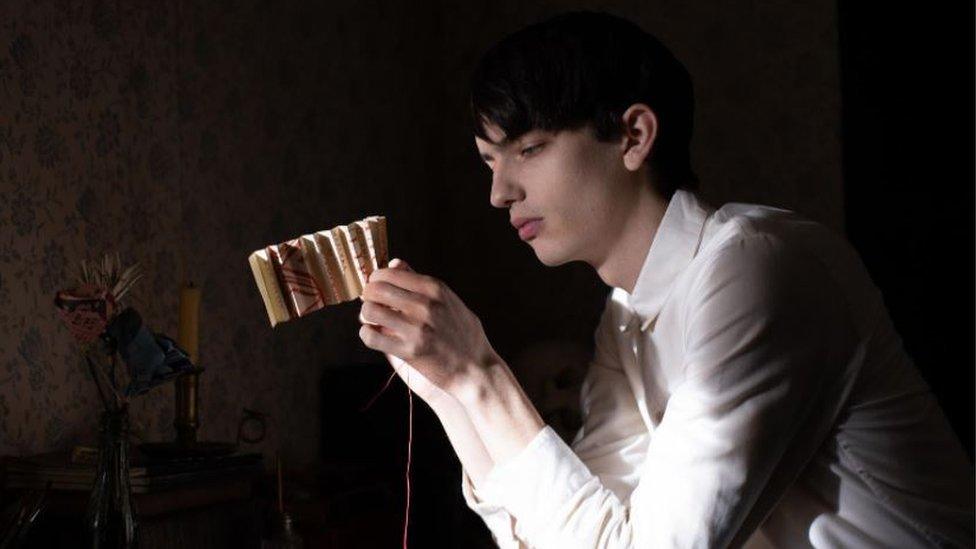
Kodi Smit-McPhee plays Rose's son Peter
He describes Rose and Peter as "a threat to the stability of what he's built", adding: "The foundations of it all will be passed onto this 'half-man' that he talks about Peter's character as being. Everything is undermined, the masculine world that he's completely and utterly sold himself on. And he's blinded by that rage."
Nevertheless, he still has empathy for Phil.
"He's a tragic figure, despite his prowess and his strength. He's damaged, damaged by his circumstance, and I think - I've got a great deal of empathy for what he was also standing for, this idea, this aching for a time that seemed to be slipping away, in this immersion in his world of work which was all about nature, and the animal, and the man."
A century after the story's setting, Campion believes the bullying experienced by Rose is "as fresh as a daisy."
"Phil is a misogynist. Women do experience bullying quite a lot but they are not the only ones to experience it. These kinds of bodies are bullies to everyone. These are definitely things I have experienced, that sort of dominance that some men work with and some women can work with it too. It's about power as much as anything else."
'Cumberbatch's sensuality'
Campion was awarded the best director prize for The Power of the Dog at this year's Venice Film Festival, and both she and the main cast are being tipped for Oscar nominations.
The director refers to Cumberbatch as "a thespian, an English gentleman" but that her instinct was he'd be right for the role of the rancher.
"If you see his work in Sherlock, he's just got this body energy, but he's got this ability to open up and show his vulnerability, and not all actors have it to the degree he has. I was betting on that quality, because if you don't have it, you can't create it.
"Some of the best material in the film comes from his ability to show his grief, and his sensuality. I figured he could offer us a very special Phil, and maybe other actors would do it differently, but I was interested in the way Ben would figure it out."
Cumberbatch adds that his respect for Campion and her work spurred him on throughout the shoot.
"I really had to go the full distance, because it's such an opportunity, and I think my primary goal was just to make the experience match the expectation," he says. "Both for me as an artist, but for Jane and the promise that she thought I had, and the honour of playing the role for her. I really wanted to match that. So, I just had to go there. And it was great."
The Power Of The Dog launches in select UK cinemas from 19 November and on Netflix on 1 December 2021. BBC Talking Movies' Award Season Lookahead is on BBC News and available on BBC iPlayer.